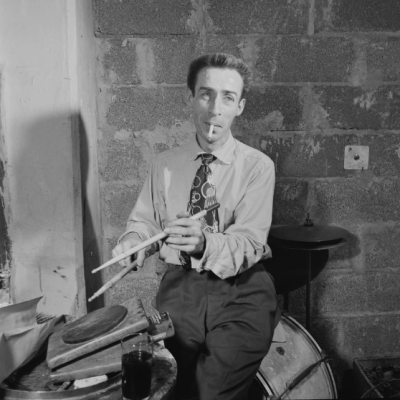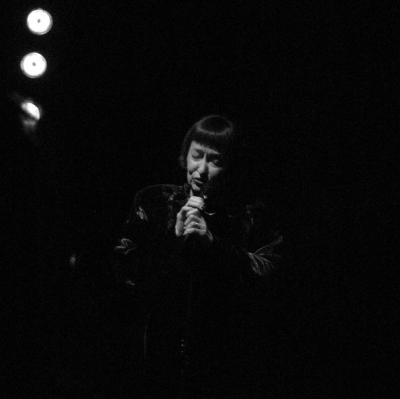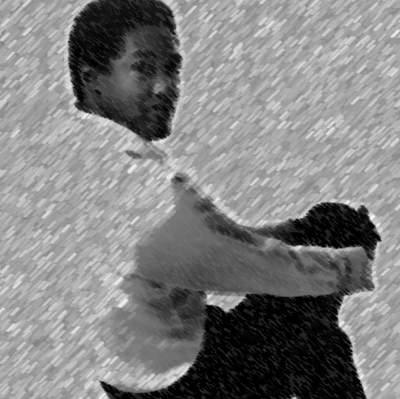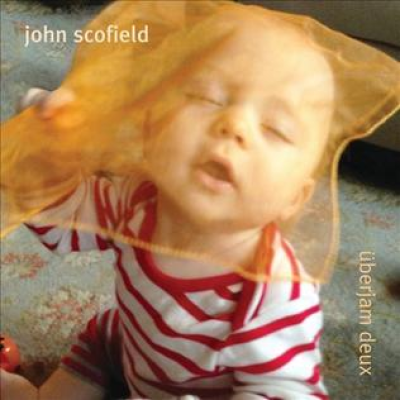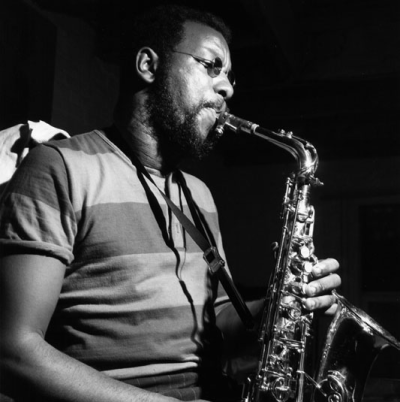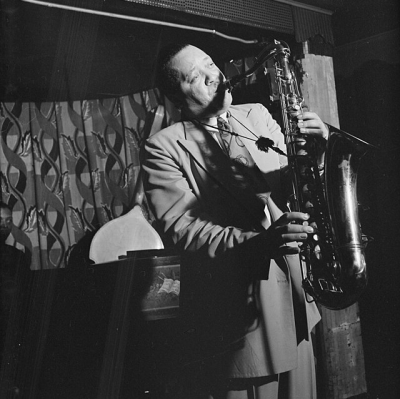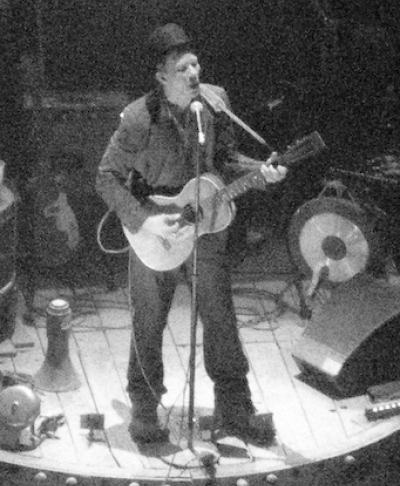“Improv,” a story by Lorna Wood, was a finalist in our recently concluded 46th Short Fiction Contest. It is published with the permission of the author.
*
Improv
by Lorna Wood
This was all her fault, Sarah thought, as she watched the Victory Lounge clear out. She should have known Branchville wasn’t ready for improv jazz. But the bass player, Tommy Williams, had been so supportive after the workshop with the graduate wind students. Sarah had gotten so interested in the group’s ideas about jazz and improvising that she had gone straight to the practice room after the workshop and found their website. Earbuds in both ears, she was improvising to one of the rhythmic bass tracks there when she happened to raise the bell of her clarinet on a long high note the way she’d seen the quartet’s wind players do, and there was Tommy knocking on the door.
He had been so just what a jazz bass player from Chicago should be, Sarah thought, with his dusky skin and his smoky voice, and his rakish fedora tipped over one eye. And at the same time he had been so genuinely pleased at her enthusiasm, so encouraging without a hint of condescension, that Sarah had almost jumped up and down when she had the idea of inviting them to play at the Victory. In fact, the only thing restraining her had been the fear that they would scorn such a venue. It never crossed her mind that Charlie, her brother and the owner-manager, might not want them.
Her shining eyes and glowing account of the talent the group had exhibited at the workshop soon convinced him, though, and at first everything seemed to go well. Branchville didn’t have much of a jazz scene, but it didn’t offer much else to do on a Friday night either, and the enclosed room at the back of the lounge was packed as Johnny Newland, the oldest member of the quartet, lifted a tenor sax from his array of instruments, tossed back his thinning mop of gray hair, and began with a single, keening note held achingly long.
At first Joe Henley, the introverted lower winds man, had simply stood motionless, slightly behind Johnny, his dark skin seeming almost to dissolve into the shadows at the corner of the lounge. But suddenly, up came his gold alto sax, glinting in the light, and Joe joined in, playing with his eyes closed and swaying slightly as he built the tension with intertwining, unpredictable harmonies and discords, and finally a few ornaments that somehow morphed into a sort of rhythm. At this point, Scott Rankin, the bearded guitarist, began to slap his guitar, nodding his head as if to emphasize the way he was creating the first aggressive newness—a counter rhythm. People who had been sprawled out in the fat leather armchairs of the back room, sipping their drinks and still conversing in low tones, began to sit up and take notice, which Sarah was pleased to see.
All this time Tommy Williams had himself been sprawled in his seat, his long legs casually splayed out on either side, his bass guitar to all appearances forgotten on his lap. As the amplified slappings attacked the tender introspection on the other side of the ensemble, however, Tommy lazily lifted one hand and strummed a single low note.
Alone, the note was nothing, but repeated with more insistence, it became a rhythm. Suddenly, magically, the slappings were tied to the low ornaments in the alto sax. Johnny Newland put down his instrument to listen, and Tommy finally put his left hand up to his guitar to build a bass riff—first two notes, then four, then a space and a whole, regular rhythm of notes took hold, rising and falling over the slappings of the guitar like the sinuous thrusting of lovers to the beating of their hearts. Tommy still leaned back, but his head began to move and his lips parted as the rhythm intensified and the guitar rose and fell on his lap.
But now again Scott’s lead guitar was the troublemaker. It began insidiously with a delicate counterpoint to the riff, but this was then repeated, faster, higher, and—with adjustments to Scott’s amplifier—louder, and even with reverb—static and anguished shrieks. Johnny caught the spirit now and joined in with shrill, chattering, rapid-fire cadenzas. In the enclosed area, the noise was deafening.
Billy Alder, the university’s choral director, was the first to leave, towing his wife Cindy behind him. The Alders, Sarah knew, were conservative in their musical tastes, as in everything, so she tried not to let their departure disturb her. They had only come, she knew, because she had invited them, and they were old friends of her parents.
Unfortunately, the Alders had been sitting near the wall farthest from the door and so were forced to climb over many knees, avoid a lot of drinks, and issue frequent sotto voce apologies on their way out. But by this time Joe Henley’s alto had joined the chattering, and the whole group was so involved in their playing that Sarah hoped they had not noticed. People standing over by the wall quickly took the Alders’ chairs, and the crowd was not perceptibly diminished.
Soon enough the bass riff declined to a single low, throbbing note, the chattering gradually fell off into scales, and Scott abruptly silenced his guitar, except for a random scattering of faint high notes, produced by plucking the strings around the tuning pegs—these reminded Sarah pleasantly of raindrops. Then the scales died away, the raindrops were overcome by the throbbing, and finally even that subsided into a poem of stillness, broken at length by healthy applause. “So far, so good,” Sarah thought.
Scott spoke into his mic while the rest of the group had a breather. Without getting up, but turning his earnest eyes and bushy beard in the direction of the crowd, he explained how, while each member of the group had “been around the improv scene in Chicago for many years,” the group had never played together before. This did not matter, however, Scott explained, because the very essence of improv was independence. Not only were all the players free at all times to respond—or not respond—to the playing of the others in whatever ways the spirit moved them, but they all had at their disposal every musical tradition ever conceived. From Bach to funk to fusion—all were literally at their fingertips, to sample whenever and however they chose, along with any non-musical noises they and their instruments might be moved to make.
He closed with something he had also said earlier, at the workshop. “The most wonderful thing about improv is, there are absolutely no hard and fast rules. The only real rule we follow is—ya gotta break the rules.” He said that last part very close to the mic, in a deep, cool, jazz player’s voice, and everyone laughed and wished life were more like that.
Sarah thought of her own rule breaking—how after her parents had died, she had deserted her perfectly good job teaching middle-school band and left Matt, her longtime boyfriend, on the pretext of having to take care of her parents’ house and affairs, but then had ended up staying on, living in the house, helping Charlie open up the Victory, and getting a master’s degree in clarinet performance, just because she wanted to. She still saw Matt—he was very earnest, and she was, after all, only two hours away—but she was not really sure how she felt about him. Poor earnest Matt, who always remembered special occasions with the same red roses and made love to her every Friday night like clockwork, and—well, “like clockwork”—that pretty much said it all. Things had wound down with Matt, and Sarah had no idea what key might set them going again, or whether she would want that, even if it were possible.
An unholy din broke in on her meditations. As if to underscore their unfettered musical state, Scott and the two wind players had abruptly embarked on a rising series of cacophonous glissandi. Johnny Newland was playing his on a shrill penny whistle, while Scott accompanied himself with plenty of static and reverb from his amplifier. In vain did Tommy Williams try to thunder out a broken chord riff in the bass by way of an ordering principle: this only increased the pandemonium.
To her dismay, Sarah saw more people getting up to leave. Charlie appeared in one of the two doorways to the room, looking as if he’d been sucking a lemon.
Soon it was all too easy for Sarah to get up and go over to him. Crestfallen, she saw that the bar had largely cleared out as well. “I’m sorry,” Sarah said miserably.
Charlie had always been the most conscientious member of the family. Now he shrugged. “My bad. I should have heard ’em first,” he said.
“You gotta believe me,” Sarah pleaded. “They weren’t like this in the workshop.”
He patted her arm, and Sarah wasn’t sure which was harder to take, his misery or his sympathy. “Don’t beat yourself up about it, little sis. I know you were only trying to help.”
#
Back in the emptied room, the quartet was packing up, and Sarah wondered what she should say to them. She was embarrassed at the closed-mindedness of her little town, especially that of those who called themselves music lovers. On the other hand, she had to admit that even she herself had found some of the performance hard to listen to—but was that merely her own ignorance and reluctance to venture outside her comfort zone?
She was relieved when Johnny Newland and Tommy Williams strolled out together without much comment. Tommy Williams merely tipped his fedora to her and said he hoped to see her at their concert at the music building the next night. Johnny, weighed down with his many instruments, only nodded his shaggy head to second the invitation. Sarah assured them she’d be there and watched Tommy’s easy, loping walk through the bar and out to the street before turning back to make what apologies she could to the other two.
Joe Henley was already ensconced at a table in a far corner of the room, his dark form barely visible in the gloom. Scott Rankin, seated with him with his back to Sarah, was talking animatedly. Though she was hesitant to approach them, Sarah felt she, as hostess for the failed occasion, must at least try to say something helpful.
Joe gestured in her direction as she came up, and Scott turned with a smile. “Oh hey,” he said, as if the evening had not been a disaster at all, and he patted the chair next to him.
Though Sarah would have preferred to huddle miserably in the dark corner with Joe, away from Charlie’s forgiveness, she dropped obediently into the armchair. It was the least she could do. “I just wanted to say I’m sorry,” she said sheepishly. “I think Branchville’s not ready for you guys.”
“Oh well, you know . . . “ Joe began, in his fruity baritone, but he trailed off as Scott cut in.
“Totally understandable, Sadie. I was just saying to Joe here—real improv is an acquired taste. Like this.” He held up his shot glass and admired its amber contents before downing them. Then he let out a satisfied “Ahh,” wiping some stray moisture from his beard with his sleeve. “Single malt. You should try some.”
Sarah did—the more readily as the expensive beverage would help make up the lost business for Charlie. She also refrained politely from correcting Scott about her name. At first the aggressive, malty taste seemed unpleasant—Sarah drank rarely, and then only wine, beer, or the occasional fruit-juice and rum concoction. But just as she had embraced the spirit of adventure in the improv workshop, and before that in pulling up stakes and returning to school, now she—or rather, Sadie, as he kept calling her—began to relish the smooth fire flowing over her palate and setting her aglow inside.
Scott seemed to appreciate the effects of the scotch on her as well. The roominess of their armchairs hindered casual contact, but he contrived to stretch his legs out so as to touch hers, and he kept reaching over and laying his hand on her arm as he praised her enthusiasm, made listening recommendations from his near encyclopedic knowledge of jazz recordings, and spoke of the difficulties she would face trying to break into Chicago’s jazz scene.
This last especially excited Sadie. Whereas Sarah had thought of an understanding of jazz improv as an interesting new dimension of music to pursue in her spare time, or possibly a means to starting a small jazz band at her school when she went back to teaching, Sadie was ready to dive right in. She even added several contacts Scott recommended to the list on her phone, though her fingers fumbled a bit, and some of the information was lost in translation.
And Sadie took it in stride when Scott came back from a trip to the men’s room and she suddenly felt his heavy hands on her shoulders and his hot, scotchy breath in her ear. “Hey Sadie, that manager dude is giving us the fish eye. Why don’t you come back to my room at the hotel and chillax to some Charlie Parker? I scored some awesome hash.”
Whereas Sarah disapproved of drugs and men who invited women to their rooms with cheesy lines, Sadie looked forward to seeing how the hash would amplify the alcohol high, and when she turned her head to say how much she had always loved Charlie Parker, she quite naturally reached up to caress Scott’s rough-soft, reddish beard and found herself swept into a passionate kiss, despite the full glare of her brother’s “fish eye.”
Since the hotel was only a few blocks away from the Victory and neither Scott nor Sadie was in any condition to drive, they walked there, pleasantly stumbling and falling against each other from time to time and occasionally kissing. Only when they were actually entering the hotel did it occur to Sarah to wonder if they had said goodbye to Joe, or if he had dissolved into the darkness at some time before they left. But Sadie did not worry about trifles like that. Although it was the University Hotel and fancy, Sadie did not even worry about security cameras in the elevator when Scott put his hand between her legs.
They forgot about Charlie Parker and the hash. Scott just took the opportunity, while Sadie was in the bathroom to set his iPod up to play whatever was next on his playlist through a speaker, and this happened to be the jam session the quartet had recorded just before embarking on this tour, so that when Sadie came out and Scott leapt on her, their lovemaking was accompanied by more of the strange alternations that had already defined the evening.
#
Afterwards, soaking long in the tub as all remnants of Sadie drained away, Sarah was not sure how she felt about it all. Certainly it had been an adventure. Certainly she had never before had her clothes ripped off—literally ripped, so that when doing the walk of shame (or triumph?) back to her car the next morning she had to hold the front of her dress together and pretend she was cold, though the weather was mild for October. Certainly Scott had imagination and stamina, and Sarah had to admire Sadie’s utter lack of inhibition. Still, Sarah thought, soaping the bite mark on her shoulder and analyzing the throbbing from the scotch and that time her head had been thumping against the wall before he switched her so that it was dangling down over the side of the bed—still, even Sadie would have liked to be held. Waking up hung over with Scott’s heavy arm draped across her wasn’t the same.
Sinking down in the warm water, Sarah drifted. It all would have been so different with Tommy Williams, she thought, remembering the rise and fall of his bass guitar on his lap. It would have been like that time her family stayed down on the Redneck Riviera and she dove into the waves farther and farther out until everyone back on shore was small and distant, and then, rocking and tossing her up and down, forward and back, but always inexorably more forward, the ocean returned her until she rested gently on the sand between the life-sized, happy faces of her family, and the wistful, infinite possibility of the ocean. That was just how it would have been to rise and fall on Tommy Williams, to let go and arc backward while all the time his strong arms held her, pulling her slowly back to him until she could wrap her arms around his neck and pillow his face against her breasts.
#
Some two weeks later, in the middle of a week, with no warning and not at all near Thanksgiving or any other occasion that would warrant a visit, Matt pulled up outside Sarah’s house and came to the door bearing his usual red roses. Sarah, who had been practicing, set down her clarinet and ran to greet him. “Matt! How sweet—but what’s up?”
The roses were between them. She had taken them and was standing there as he answered. In the car, all the way down from Chattanooga, he had felt confident that she would be thrilled by the surprise, but now he was as overwhelmed with uncertainty as when she had suddenly announced her plan to leave him, a year ago, “just for a little while.”
“Does there have to be a reason?” he faltered, looking at his shoes.
“No. No, of course not,” she said, opening the door wider and stepping back to let him in. “These are beauti—“ she began, looking at the roses, but he stopped her with a kiss. “You’re just full of surprises today, aren’t you?” she said, when he had finished, and she touched his cheek lightly with her fingertips. She looked pleased, he thought.
The stems were planted in moist foam for the journey. It took a while to cut them, find a vase, and empty the little plant food packet into the water. Meanwhile, Sarah heard an unusual amount of clattering coming from the front hall and the living room. Clearly he had packed more than his usual overnight bag. Sarah hoped he was not planning to move in or anything—surely even this new Matt wouldn’t just assume that was o. k., without discussion?
As she was coming back with the roses in a vase, she heard, unmistakeably, a bass riff, a second before she saw Matt on the sofa, leaning over the instrument in his studious way.
She set the roses down extra carefully because she felt she might drop them. He leaned back, grinning shyly up at her. “What do you think?—don’t be too brutal, now.”
“It’s beautiful,” Sarah said, coming close to touch the satiny, dark red finish. “I never knew you—“
“I know, right?” he interrupted. “Well, I wouldn’t ever call myself a musician in front of a real musician like yourself, but a couple of guys in my building were talking about starting up a band, and—you remember Amber, my paralegal?—I never knew it, but she’s a fine singer. So—make a long story short, I decided to get this old thing out of mothballs.” He strummed reflectively and adjusted the connection with the amplifier.
Sarah remembered when he had hired Amber, a gum-chewing redhead with a loud laugh. Sarah was surprised Amber was still employed, let alone—While she was thinking about Amber, Sarah absently twisted her hair up off her neck in a way she knew Matt liked.
“Aw baby,” he said, breaking off in the middle of his riff and setting the guitar carefully to one side of him on the sofa. “You know what that does to me.” He moved closer to her, nuzzling her neck. “Let’s you and me go upstairs.”
“Why?” she said. “Charlie’s at work the whole day.” She got up on her knees on the sofa, then flung one leg over him, straddling his lap.
He looked gratefully up at her. “This might could work, I reckon.” Before he slipped off her sweater, he drew her close enough to hear, beneath it, the quickened beats of her heart.
_____










